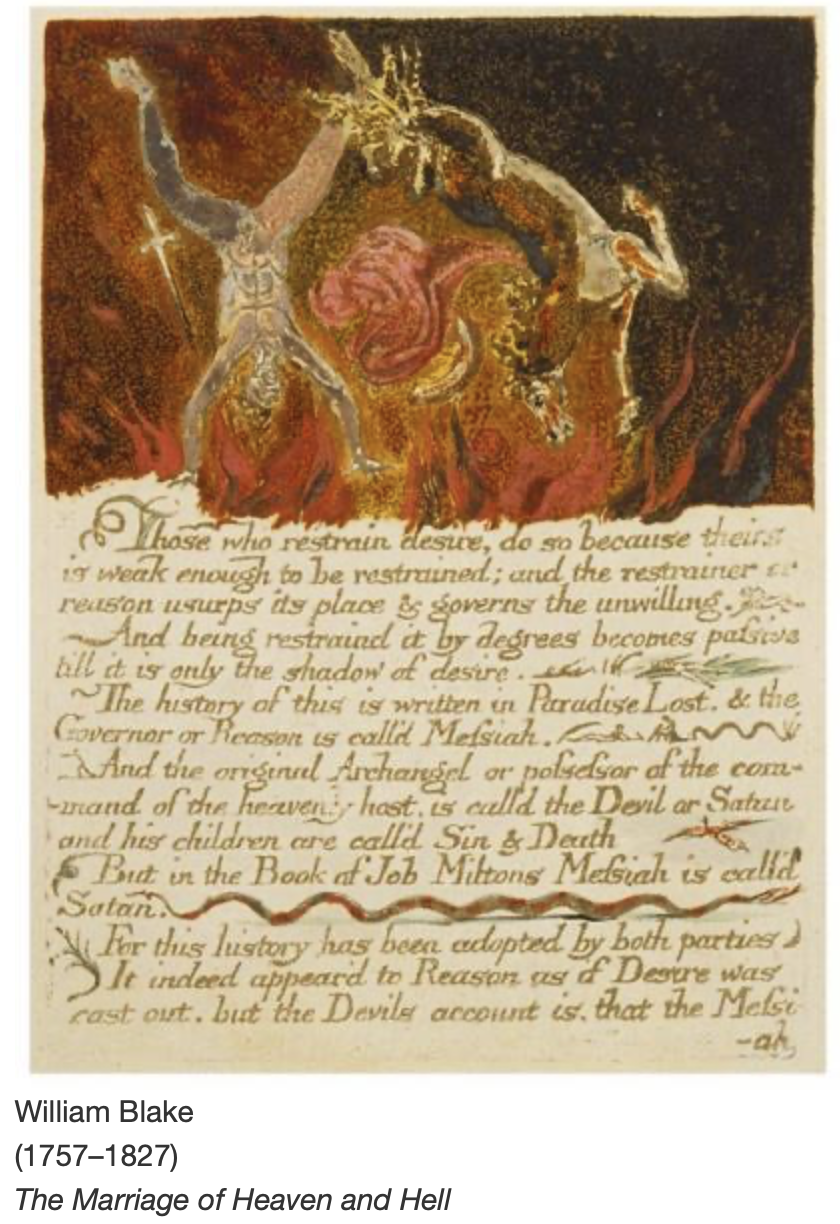The time between Rosh Hashanah and Yom Kippur is supposed to be one of of taking stock of one’s actions. Contemplation of right and wrong, of divine judgement and human repentance, might guide an annual reset. Not a bad idea given that we could all improve on ourselves, even if I don’t buy into the belief that some higher agency will dish out consequences (the concept of hell is conspicuously absent in Judaism but there is a judging G-d.)
I have my own do’s and don’t’s list, in addition to the usual ones that define a moral person. One of the don’ts is to post poems that I fail to understand, necessitating spending the better part of a day to read up on possible meanings. One of the do’s is to break my own rule when what I learned really fits with the focus of the week, defining good or bad, as well as how what we know shapes our beliefs and subsequently actions.

The cryptic poem can be found at the beginning of William Blake‘s book The Marriage of Heaven and Hell, introduced as “The Argument.” (The full version of the short book, without the engravings, can be found here.)

What I knew: Blake was an exceptional artist with a visionary mind. He was a poet, a painter, an engraver, combining his skills to produce works that were multilayered, drawings interacting with the text. I was also aware that he was, in the context of the revolutionary movements of his time (we are talking the late 1700s,) a strong voice for change and breaking up patterns dictated by church and state.
What I learned about this particular poem: it was a parody directed at the religious cult around a philosopher guy named Swedenborg (never heard of him.) It used imagery directly derived from the Old Testament (who knew) and is populated by characters that are interpreted in 100 different ways by Blake scholars (and there are many – how would I choose?) It also tries – that’s where it gets interesting – to break up the dichotomy between angels and devils, the meek, rational, obedient good people, and the energetic, sinful, creative, rebellious bad ones. If you can figure out how that can be inferred from the lyrics you have a clear advantage over me. Something about the meek and the wild switching habitats? Crossing over?

The text goes on with prose, which makes it a little bit clearer:
“Without contraries is no progression. Attraction and repulsion, reason and energy, love and hate, are necessary to human existence.
From these contraries spring what the religious call Good and Evil. Good is the passive that obeys reason; Evil is the active springing from Energy.
Good is heaven. Evil is hell.“
Blake insists that our existence depends on a combination of forces that move us forward (the marriage of the title.) It might be in the interest of those in power wanting to the retain the status quo, to designate us into “Team Good” and “Team Evil,” but for progress to happen we have to acknowledge that we are “Team Human,” as someone cleverly said. (My main source for what I learned was an issue of Image/Text (3.2) entirely devoted to scholars of the artist.)
Being human is not either/or, all good or all vile. We are complex enough to accommodate impulses from all directions, to heed some more than others, or do so in different contexts or different times. We might be the just (wo)man at times, or the sneaking, snaky villain at others, going from meek to enraged or in reverse. Change, both in the personal and the political realm, depends on it. Change, in the New Year, will depend on embracing all of what makes us human, and not waste energy to isolate bits and pieces at the expense of others. Intellect and sensuality, rationality and emotionality, acquiescence and rebelliousness can and must coexist.

Blake delivered this progressive message in a time of political upheaval both in the Americas and during the aftermath of the French Revolution, and I would never have known, if not for those who teach this stuff. Which brings me to a contemporary essay, also with a focus on the relative merits of acquiescence and rebellion, that outlines the danger of selective telling of history (in this case linked to the celebration of Labour Day.)
Adam Johnson, one of the most incisive young writers around, and Sarah Lazare deplore in The Column how even seemingly “progressive media outlets minimize radical elements of American history and recast liberal reforms as the primary movers of justice and political change.” It’s a short read and worth your time, providing food for thought why the establishment clings to meek(er) agents of change and prefers them to the call for more energetic rebellious action in Blake’s terms.
Let’s read up on our history!

Images today are selective Plates of Blake’s book, from an exhibition at the Morgan Library & Museum, some years ago.

Here is some of Blake’s work set to music by Benjamin Britten.







Laura Harbert
My favorite Blake quote, “We become what we behold.” Thank you Fri for helping me behold complex humanity this morning. I appreciate you.